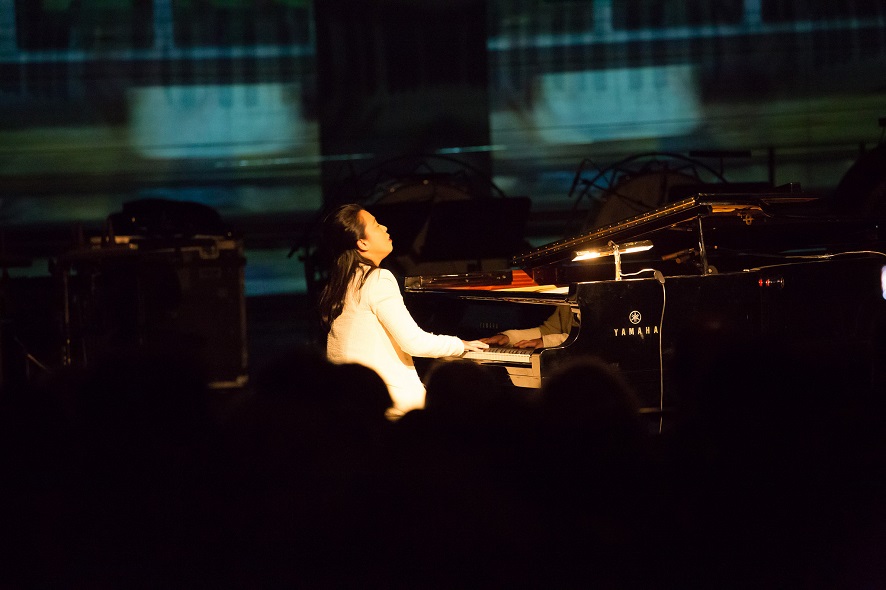The setting: The huge Gleishalle [former railcar loading dock] in POSTCITY Linz. A single piano is the centerpiece; jumbo-format projection surfaces provide the backdrop. A pianist takes her place at the keyboard, and the evidence of her artistry slowly fills the post-industrial space. Real-time visualizations of the sounds appear in the background.
On Festival Monday, September 11, 2017, the old Gleishalle will morph into a concert hall, the setting of Maki Namekawa’s Austrian premiere of all 20 piano etudes by composer Philip Glass. The pianist’s work will be accompanied by artist Cori Olan’s real-time visualizations.
The duo’s two-hour performance is certain to enchant their audience in this impressive location. We met with Maki Namekawa to find out more about the music, the special qualities of POSTCITY as a concert venue, and her appearances at the Festival.
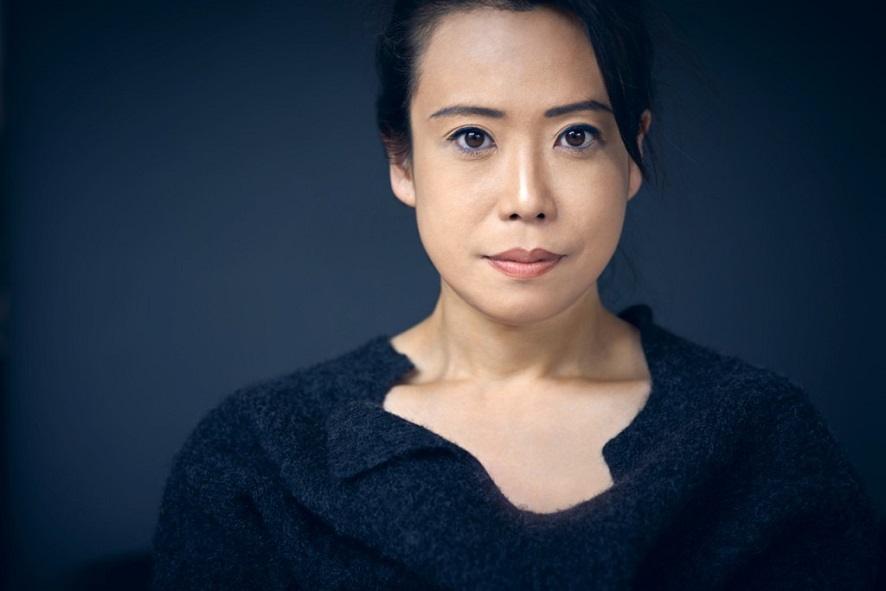
Credit: Andreas H.Bitesnich
At the 2017 Ars Electronica Festival, you’ll be performing the 20 piano etudes by Philip Glass. Please tell us a little about these pieces.
Maki Namekawa: Philip Glass created his 20 piano etudes over a period of 20 years. Numbers 1-10 were composed about 20 years ago, and 11-20 over the past 10 years. Nevertheless, Philip Glass didn’t compose an etude every year. Actually, he tended to work in blocks. Moreover, the order in which they’re played doesn’t correspond to the dates of their creation. For example, the first six were composed for my husband, Dennis Russell Davies, on the occasion of his 50th birthday.
Finally, I played the 20 piano etudes together with Philip at their premiere in Australia at the Perth International Arts Festival. And we’ve been on tour ever since—in more than 10 countries so far, including Japan, the USA, several European countries and Mexico. After the Ars Electronica Festival in September, we’re flying to Brazil. Philip Glass and I divide up the etudes between us, and we also bring in a local pianist. Occasionally, there are even five pianists, and there were 10 of us once.
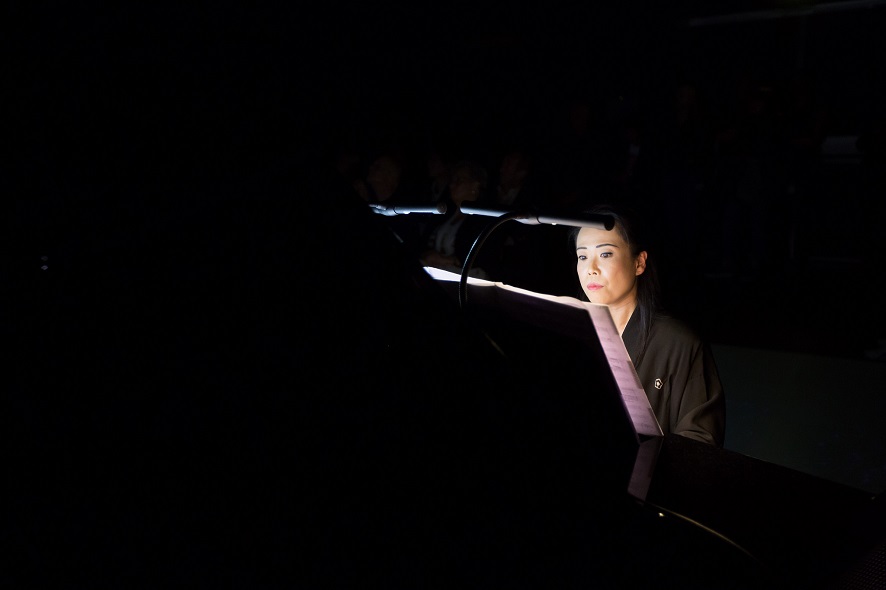
Credit: Tom Mesic
At the Festival, you alone will be playing all 20 etudes in two one-hour blocks…
Maki Namekawa: Since last year, I’ve also been playing them alone. In 2015, I recorded them all for a CD, and since then I’ve also been playing them without Philipp. But when I play solo, artist Cori Olan accompanies me with visualizations of the music. At the Ars Electronica Festival two years ago, we chose a couple of the etudes and performed them for the first time with real-time visualizations.
What technical challenges do these 20 etudes confront you with?
Maki Namekawa: When Philip Glass composed the etudes, he wrote the first 10 for his own piano technique and, at the same time, to nurture his own composition technique. He knew that he wouldn’t play all 20 alone. Beginning with Number 11, you notice a very wild piano technique. Compositionally, that’s really very innovative. When you listen to etudes 1-10 and then take a short break and come back for the second half, you’re then confronted with a totally different world.
How is it for you as a pianist to play to real-time visualizations?
Maki Namekawa: Sometimes I used to perform the “Suite from ‘The Hours’” by Philip Glass for a ballet, but I couldn’t really observe the dancing because I was simply too focused on playing. But now I’m very familiar with the pieces, I have a great deal of experience with them, so I also have the capacity to partake of the visualizations.
I really enjoyed it, for example, when we performed the etudes in New York this year. I could directly observe from the visualizations how I’m playing. It’s a little like Jazz—ideas emerge very spontaneously. What I find so wonderful about Cori Olan’s visualizations is that they get my imagination involved while I’m playing. I suddenly become aware of completely novel perspectives that I hadn’t yet discovered playing piano alone. That’s a really lovely experience!
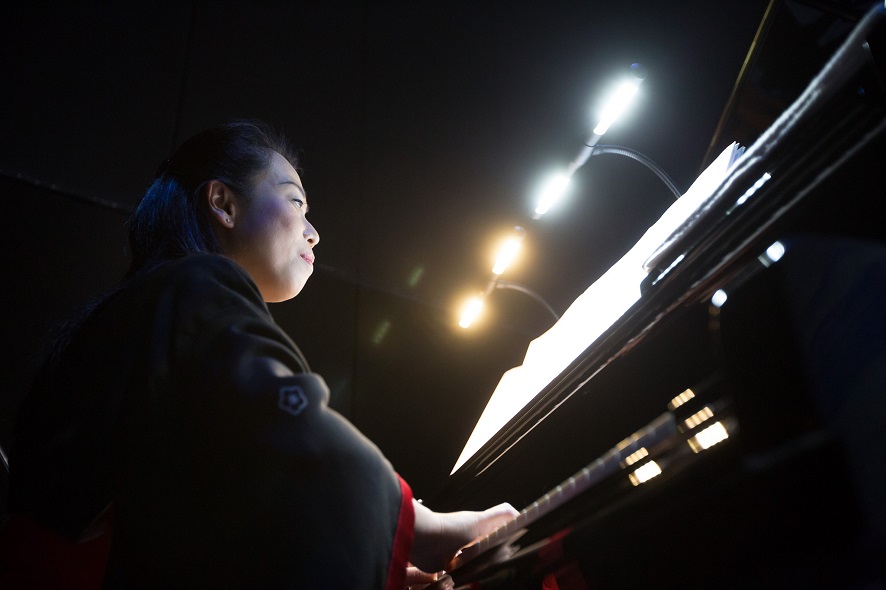
Credit: Tom Mesic
You’ll be performing the 20 etudes in the Gleishalle of this former Postal Service logistics facility in Linz. What’s special about this concert venue?
Maki Namekawa: In Austrian dialect, they would say it’s narrisch [eccentric, to say the least!]. Initially, we thought we’d perform the etudes in Deep Space 8K, which is a highly concentrated and very beautiful setting, but since it’s the Austrian premiere of the 20 etudes, we wanted a somewhat larger venue so a bigger audience can experience it all at once. The Gleishalle is very stark with a lot of concrete and a certain coolness. As a result, the audience is in a more intimate relationship with the projection screen and the piano. An entire orchestra won’t be playing; you hear only the piano. So I think it’s really unique, the way the Gleishalle allows for this triangulation involving the audience, the visualization and a single piano. On one hand, a very large number of people will be able to experience the music together, but, at the same time, each individual can shut out the surroundings and withdraw into a personal space. Especially with Philip’s music—you really go into a sort of trance. This is what we want to bring forth.
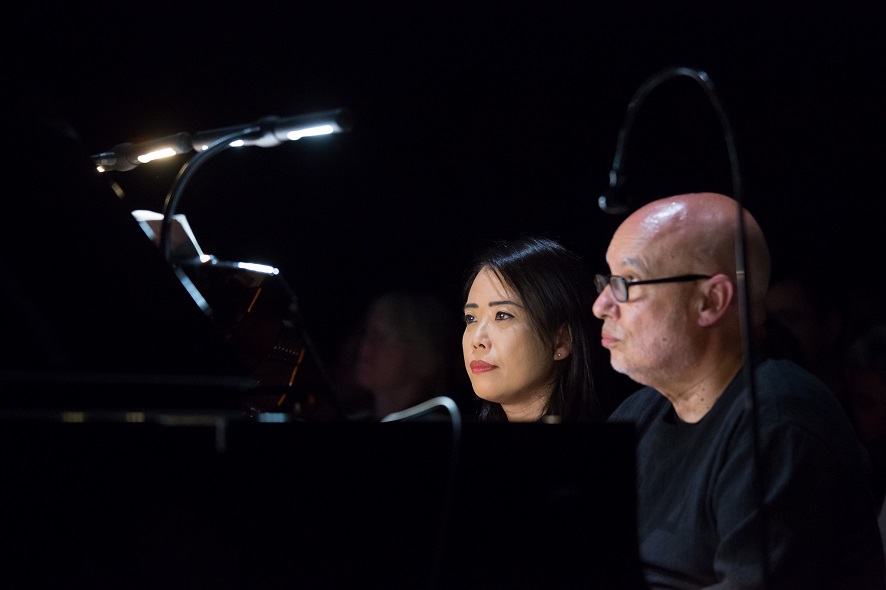
Credit: Tom Mesic
It’s a trance for you! But will it be one for the audience too?
Maki Namekawa: Yes [laughs]. As a pianist, I need a foothold, as it were, but for the audience it really can become a deep trance. Which is why the concert is two hours long—so you can really enjoy the music; totally immerse yourself in it. My wish is that the people begin by listening, but after two hours, they’re utterly engrossed in themselves. The music and the visualizations make this possible.
It’s extraordinary that the 20 etudes are all being played together in a single concert.
Maki Namekawa: Yes. And the sequence is organic and natural. When I play the etudes at home, before beginning, I often imagine that I’m at the start of a marathon and I just start running. But the pieces are so organic, so natural and so pleasant, that they really are sort of trance-inducing. For the audience too—you forget everyday life. The sequence of the etudes really has become quite lovely.
During the festival, you’ll also be performing “Interludium A” by Isang Yun in Deep Space 8K. Tell us about this piece.
Maki Namekawa: Isang Yun was a Korean composer. This year would have been his 100th birthday. When he was young, he studied in Japan, even though there was much friction and tension between Japan and Korea. His works are about forgetting these crises and conflicts and simply standing up as a human being. Once, he was even kidnapped due to his political views, and he spent some time in prison. For a long time, it wasn’t clear whether he’d survive or not. During his incarceration, he composed many pieces that were very politically motivated—they’re about Korea’s freedom, and human freedom and depth in general.
“Interludium A” concentrates on the key of A, which is right in the middle of the piano keyboard, right in front of the pianist’s navel. From this starting point, the piece moves successively upwards as if ascending into the heavens, and then downwards into the depths. It’s a simple movement, but the thought behind it is the principle of yin and yang. Inherent in this is Korean-Asian concept or philosophy is the assertion that there is a positive and a negative in everything. Life has its ups and downs; it’s normal to have good times and bad times. This is all a part of life, and that’s what this piece is all about. Cori Olan will be designing the visualizations here as well. His insights into this music are most profound, and I’m very much looking forward to seeing his work.
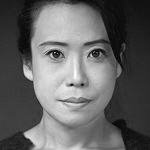
Maki Namekawa is one of the notable artists in her field. She regularly performs classical as well as contemporary music by the great international composers before huge audiences, and has displayed her artistry as a soloist and chamber musician at such major venues as Suntory Hall in Tokyo, Carnegie Hall in New York, Cité de la Musique in Paris, Barbican Center in London, Musikverein in Vienna, PianoFestival Ruhr, Rheingau Festival and at the Musik-Biennale Berlin. A CD containing all of Philip Glass’ piano etudes performed by Maki Namekawa was released in 2015 by Orange Mountain Music. It topped the iTunes Classic Charts and received high praise from BBC Magazine.
Maki Namekawa and Cori Olan will perform “20 Etudes for 20 Etudes” on Monday, September 11, 2017 at 7:30 PM in the Gleishalle at POSTCITY. Find out all the details in our festival catalogue. Plus, Maki Namekawa will give a daily performance of “Interludium A” accompanied by Cori Olan’s visualizations in Deep Space 8K at the Ars Electronica Center. Details about the performances will be posted on our website.
To learn more about the festival, follow us on Facebook, Twitter, Instagram et al., subscribe to our newsletter and visit our website at https://ars.electronica.art/ai/en/.
